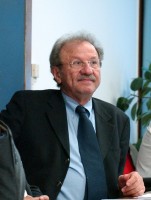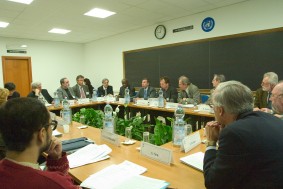Personal tools
News from ICTP 109 - Features - Palis

Jacob Palis, professor and former director of the Instituto Nacional de Matematica Pura e Aplicada, Rio de Janeiro, Brazil, was appointed chairperson of the Centre's Scientific Council last year. Palis, whose personal and professional ties to ICTP date back nearly a quarter century (see News from ICTP, Winter 1999, p. 13), recently sat down with ICTP's editor to discuss his long-time association with ICTP and his hopes for the Centre's future.
At the Centre with Palis

Jacob Palis
How did you first become involved with ICTP?
I first became involved through E. Christopher Zeeman, a mathematics
professor who worked at Oxford and Cambridge universities in the
United Kingdom in the 1950s and early 1960s and later was responsible
for building the University of Warwick into a world-class mathematics
centre. He was a close friend of Abdus Salam and, in the late
1970s, he mentioned to Salam that he would be interested in organising
a series of workshops on dynamical systems at the Centre designed
primarily for students from developing countries. Zeeman had a
wonderful temperament and, like Salam, displayed great enthusiasm
for science. In the mid-1960s, I had been a graduate student of
Steven Smale at the University of California in Berkeley. Smale
is a superb mathematician--a Fields Medallist, in fact. Zeeman
came to Berkeley to visit for several months. He told us about
his interest in launching an activity in dynamical systems at
ICTP and asked me to share responsibility for it. It seemed like
an opportunity that I could not possibly refuse. We held the first
school in 1983, and then in 1984 established a triennial workshop
in dynamical systems. Our timing could not have been better. The
field of dynamical systems was emerging as a central one in mathematics
with Henri Poincare as its founder, followed by other giants like
Garrett Birkhoff. The emphasis on nonlinear and chaotic phenomena
and the faint hints of applications to real-world problems meant
that our studies might prove useful both to other fields of science--for
example, physics and biology--and for modelling phenomena like
climate and population growth. All of this generated great excitement
among researchers and was able to attract some of the brightest
minds around. In addition to Smale, there was Rene Thom, Institut
des Hautes Etudes Scientifiques in France, Solomon Lefschetz,
Princeton University, and before them Andrei Kolmogorov, Moscow
University, along with students like Vladimir Arnold and Yakov
Sinai who went on to have illustrious careers. Young mathematicians
in the developing world had a better chance of entering the field
as equal players since the subject was taking new and exciting
scientific turns. That's one of the reasons we could attract such
large numbers of participants from Latin America and Asia (particularly
China and Iran), and to a lesser extent Africa. All of the ingredients
for stimulating research, particularly in developing countries,
were present: the excitement generated by the freshness of the
field, the presence of some of mathematics' most prominent thinkers,
the cross-disciplinary nature of our research, and the high level
of interest displayed by developing world scientists. We didn't
know it at the time but we were riding the crest of an intellectual
wave that was breaking over the entire field of mathematics. ICTP,
thanks to its triennial (sometimes biennial) workshops, found
itself in the middle of all this. As Salam often told me, 'you
have to dream big'. We did and we have been more than happy with
the results. I was fortunate to have Yakov Sinai co-direct the
ICTP school/workshop on dynamical systems from the early 1990s,
when Zeeman became honorary director. The meeting in 2004 was
directed by fine younger mathematicians, Jean-Christophe Yoccoz
(Fields Medallist, 1994) and Marcelo Viana, and Sinai and I became
honorary directors.
What has been the long-term impact of this effort?
Our efforts certainly have had a great impact in Latin America
where ICTP activities have led to the creation of a school in
dynamical systems in Mexico and where the Centre has helped raise
the level of both research and teaching in Chile and Venezuela.
Even in my home country Brazil, where the study of dynamical systems
has been a mainstay of research for a long time, ICTP symposia
have been instrumental in moving us forward by providing Brazilian
mathematicians with an important 'window on the world' for what
is happening in the field. ICTP's dynamical systems workshops
have also had a significant influence on research both in eastern
and western Europe by providing a forum where the best minds can
exchange information and findings. So it has not just been mathematicians
from the South who have benefited from the Centre's activities
but scientists from the North too. The workshops have been among
the Centre's most successful events and, I hope, a symbol of how
ICTP's activities can have a global reach in science and mathematics
extending far beyond Trieste.
How has science changed in Brazil and other places over
the last 25 years?
Brazil's scientific enterprise has experienced a great leap forward
over the past several decades. Progress is due to two interrelated
factors: First, the dedication and enthusiasm of a relatively
small number of scientists and proponents of science, largely
in government, who have made a convincing case for building a
strong scientific enterprise; second, the availability of consistent
funding from government at levels that are adequate enough to
enable scientists to fulfill their responsibilities as both teachers
and researchers. This may sound like an obvious formula for success,
but all I can say is that if it is so obvious why has it been
so rare, especially in developing countries. I believe that science
in Brazil has now passed a threshold that will enable it to continue
to move ahead regardless of changes in the nation's politics and
economics. In fact, I am convinced that a political consensus
has been reached among most Brazilians who now believe economic
progress depends in some measure on the strength of the nation's
scientific enterprise. I would say the same situation exists in
Chile, China, India, Mexico, South Africa and several other developing
nations, where, simply put, science has arrived and is not about
to leave. And Argentina could again return to full strength since
its basic education is still strong and its culture of science
remains intact. ICTP has been a critical force in shaping the
physics and mathematics community in each of these countries--not
only by providing a model of scientific excellence but also by
proving instrumental in building the skills of their scientists
and mathematicians. Virtually all of Latin America's most eminent
mathematicians and physicists have visited the Centre on many
occasions. As Salam liked to say, ICTP has indeed been their "home
away from home."
What do you hope to accomplish as chairperson of the Scientific
Council?
I am very pleased to have been asked to head the Scientific Council.
It is indeed a great honour and a challenge. I hope that I can
be proactive during my tenure and that the members of the Scientific
Council and the staff can be supportive of director K.R. Sreenivasan's
efforts to reinvigorate the Centre's existing programmes while
developing new activities to allow the Centre to advance great
and noble goals: that is, to play a central role in substantially
increasing the number of qualified scientists everywhere in this
era of knowledge. For example, I believe that the time is right
for the Centre to forge stronger relationships with ministries
of science and technology in developing countries, particularly
countries such as Brazil, China and India, that have built up
strong capabilities in science. The purpose of our relationships
should be to develop joint activities outside of Trieste that
complement--in fact, extend the reach of--ICTP's efforts. For
example, cosponsored conferences or workshops could take place
in Rio de Janeiro, Beijing or Bangalore. The activities would
be based on the ICTP model and would draw upon the Centre's expertise
and experience. Nevertheless they would be hosted abroad. I know
some of this already happens--the High Energy Group, for example,
organises workshops outside of Trieste. However, I am talking
about doing this on a more systematic basis, sharing responsibilities,
both scientifically and financially, and making it a fundamental
aspect of ICTP's yearly events. Such efforts, I believe, would
expand both the visibility and influence of ICTP around the world.
While we reach out to new partners, I think it is important for
the Centre to enhance the quality of research taking place at
the Centre. The Council could play a critical role in this effort
by fostering new ideas and new directions while consolidating
the strong research areas at the Centre, and by instilling a renewed
sense of enthusiasm. The Council, with 10 new members, is comprised
of an outstanding group of scientists. Indeed there are several
Nobel Prize winners and a Fields Medallist among us. The prestige
of the members alone should enhance the applicant pool for new
positions. And the ideas that we bring to the table, I am convinced,
will help the Centre take on new challenges in innovative ways.

Scientific Council 2004
You've been involved with ICTP for nearly 25 years. What
do you envision ICTP will be like in 25 years?
My dream is for ICTP to be very visible in the world--not just
among scientists but among policy makers and the public. The effort
begins with the high quality of the scientists and staff who work
for the Centre. They must not only do their jobs well but also
bring a certain sensitivity and commitment to the Centre's unique
mandate to serve the developing world. All of this requires both
scientific excellence and a larger sense of purpose. Some scientists
require seclusion to do their best work. There is nothing wrong
with this. But ICTP's unique role in the world of science requires
scientists to do their best research while interacting with others.
Simply put, it is the broad visibility and presence of both the
institution and the individual scientists who work here that define
the true success of this great institution. In an era when knowledge
is critical for economic development and social justice, both
in individual nations and on a global scale, ICTP's goals remain
as important and even more urgent today as they were 40 years
ago.
Current ICTP Scientific Council members